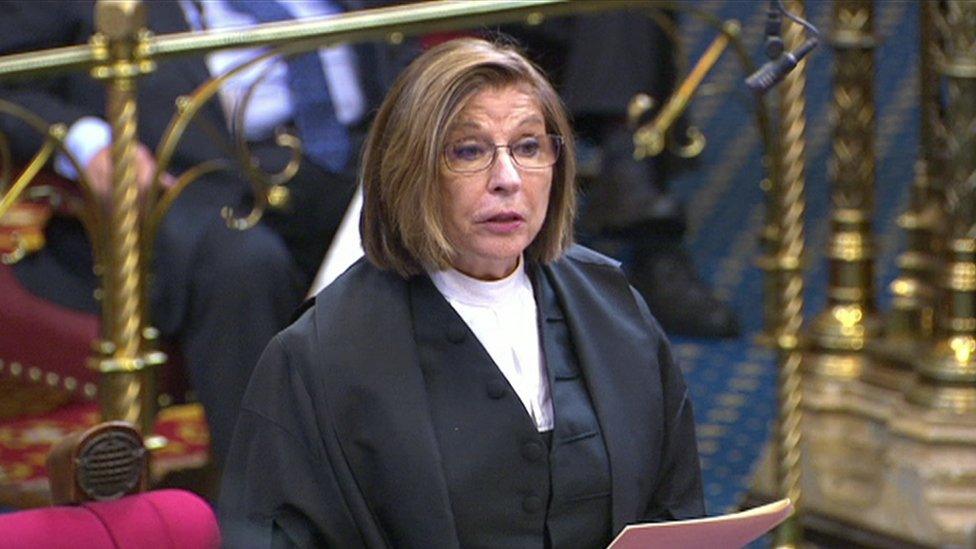The race for the Woolsack
- Published
- comments

Elections are not the same everywhere.
In the Commons, MPs campaign for internal posts almost as they do for re-election: canvassing random voters, putting out leaflets, making an effort to be seen in the right places.
In Their Lordships' House it's very different; any campaigning which goes beyond the subliminal quickly becomes a vote-losing vulgarity. A few quiet words in the Bishops' Bar, an unobtrusive reminder of one's solid track record of service, and a subtle intimation of sound views on arcane internal issues.
But listen very carefully in the red-carpeted corridors at the posh end of Westminster and that murmur can be detected, because the race is on to succeed Frances D'Souza, external as Lord Speaker. She's standing down at the summer break, and a number peers have already thrown their coronets into the ring, to succeed her in the £101,038 post.
In a rather typical Lords way, there's an unstated Buggins' turn system in operation - the first Lord Speaker to occupy the traditional seat, the Woolsack, Baroness Hayman, was a Labour peer and her successor, Lady D'Souza was a Crossbencher (indeed the Convener of the Crossbenchers). So it's now widely accepted that this is the Tories' turn....
The front-runner seems (and it's very hard to gauge levels of support in such a genteel contest) to be the Conservative former Cabinet minister, Lord Fowler. He's done the hard yards in the Lords committee system, helping set up, and later chairing the Lords Communications Committee. He has demonstrated independence of view on a series of issues like AIDS or Leveson, and he has both seniority and popularity.
Also in the running is Baroness Fookes, a Conservative MP from 1970-97, and a former Deputy Speaker of the Commons, who became a peer in 1997, and Lord Cormack a Conservative MP from 1974-2010, and a peer from 2010.
Then there's Lady Garden, a Lib Dem. She's likely to fall victim to the tribal prejudice that few Labour or Tory peers could ever bring themselves to vote for someone from her party.
The Lord Speakership is the product of Tony Blair's 2005 constitutional shake-up, which divided up the roles previously performed by the Lord Chancellor - as head of the judiciary, Cabinet minister and Speaker of the Lords. But that last role has a far lower profile than that of the Speaker of the Commons - which raises the interesting question what does the Lord Speaker actually do?
The Lord Speaker seldom speaks, other than to call votes in the Chamber and announce the results. Which is already leading to jokes about how some candidates may attract support from peers who want to hear less of them, and some will lose support from otherwise obvious backers, because they don't want their voice to be stilled.
But it's clear what peers don't want: they don't a Speaker-disciplinarian in the Bercow-Boothroyd model, bellowing "Order! Order!" from the Woolsack, and deciding which peers speak next in debates, the way Mr Speaker calls MPs in the Commons.
And still less do they want a Lord Speaker enforcing discipline or ruling on points of order. Their lordships cherish their tradition of self-regulation. Something is in order if peers tolerate it. If they don't, it's their calls of "Order! Order!" (peer pressure?) and not those of their Lord Speaker that enforce their rules. Having a strong presiding officer, it is argued, would dispel that collective, collegiate ethic.
So any candidate for the Woolsack who betrayed any ambition to actually chair their proceedings would attract few votes.
There might just, though, be some appetite for the tiniest encroachment - clashes by peers over who should speak next, particularly at question time, are on the increase. And at the moment they are normally decided by the government minister on the frontbench, which seems increasingly odd. It may be that peers are now willing to transfer that particular task to the Lord Speaker - which may seem radical to the Upper House, but is not exactly a revolutionary moment to rank with the storming of the Winter Palace.
Background issue
Lurking in the background is the issue of the powers of the Upper House.
Many peers suspect the government may soon attempt to clip its wings, after suffering 60 defeats there, in a year. The biggest of these was their rejection of the statutory instrument which implemented proposed cuts to tax credits - which prompted the prime minister to commission the former leader of the Lords, Lord Strathclyde, to review the powers of the Lords to reject SIs.
Now there's talk that a bill enacting Lord Strathclyde's proposal to end peers' ability to reject SIs, and replace it with a new power to ask the House of Commons to think again when a disagreement exists but to leave the final say to the elected House of Commons.
To some extent this would be a party political issue; if it was attempted, it would probably take the form of a government bill, so it would be awkward for an impartial presiding officer to intervene.
But all the same many peers will want to know where the candidates stand, and whether they would attempt to defend the Lords in that event. Certainly it is a question that is bound to come up in the hustings that the main groupings in the Lords are likely to hold.
And it's worth remembering that one of the reasons Baroness D'Souza was elected to the Woolsack was her promise to peers, echoing the Commons Civil War hero, Speaker Lenthall, who faced down a reigning monarch, backed by armed retainers: "I have neither eyes to see nor tongue to speak in this place but as the House is pleased to direct me, whose servant I am here."